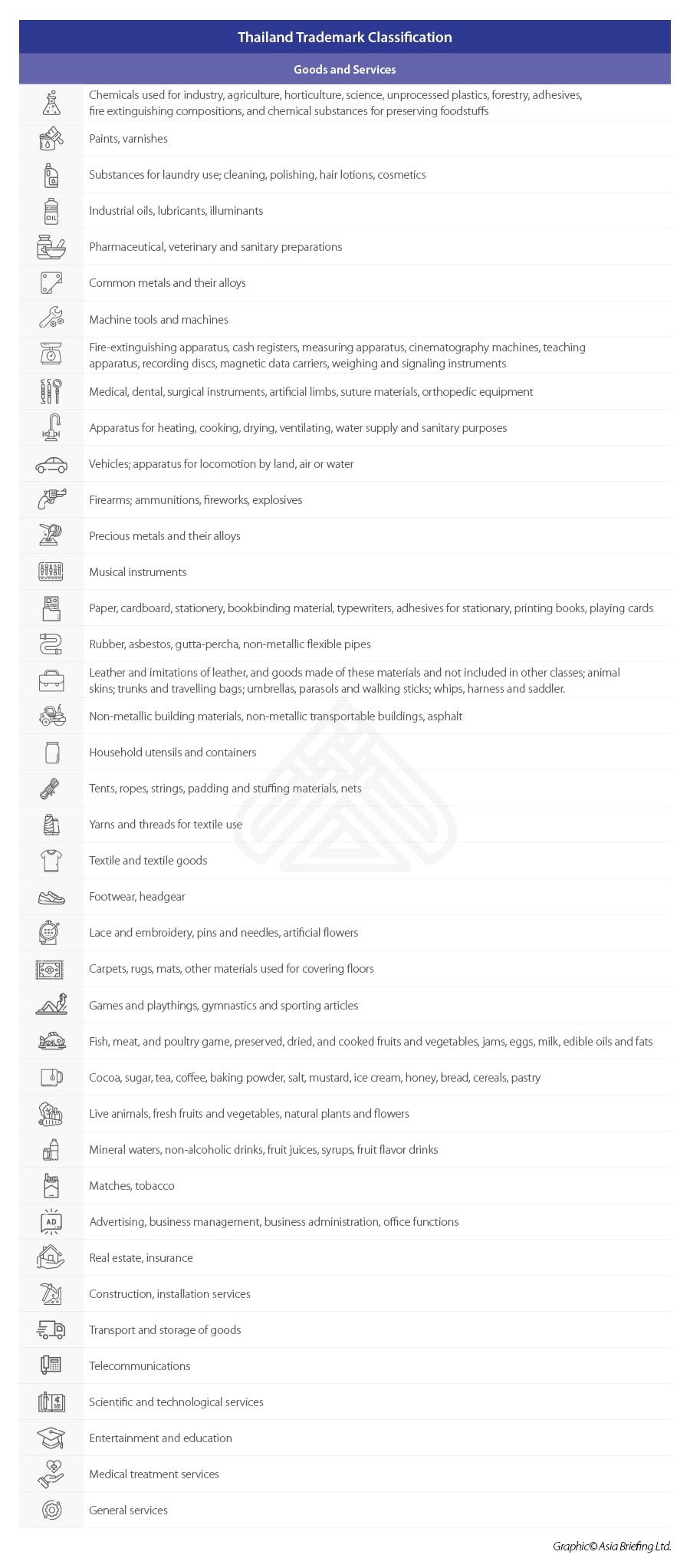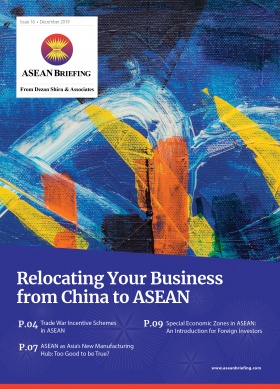Registering a Trademark in Thailand: A Guide for Foreign Investors
- Trademarks, certification marks, collective marks, and service marks in Thailand are protected by the Trademark Act (No.3) B.E.2559 (2017).
- Trademarks are registered with the Department of Intellectual Property and non-residents can only register by appointing a Thai resident by granting them the power of attorney.
- Thailand’s new fast-track system for trademark renewals will ensure that the examination of applications and granting of the certificate of renewal only takes 45 minutes.
Heavily trade-dependent, Thailand exports over US$250 billion worth of goods and services annually. Foreign companies must understand trademark protections in the country if it is a key sourcing destination as the safeguard of designs and other intellectual properties are directly related to the maintenance of profits and brand value.
Trademarks, certification marks, collective marks, and service marks in Thailand are protected under the Trademark Act B.E.2543 (1991) as amended by the Trademark Act (No.3) B.E.2559 (2017).
Further, Thailand is a signatory to both the Paris Convention for the Protection of Industrial Property, the Madrid Agreement Concerning the International Registration of Marks (Madrid Protocol), and the Patent Cooperation Treaty (PCT) and has acceded to the World Trade Organization (WTO) Agreement on the Trade Related Aspects of International Property Rights (TRIPs).The Madrid Protocol allows a trademark owner in a member state of the Madrid system to extend the trademark to any other member state, by applying for international registration. This enables the trademark owner to establish multiple trademark registrations in various jurisdictions. The period of protection lasts for 10 years, after which it can be extended for another 10 years.
How do you register a trademark in Thailand?
Trademarks are registered with the Department of Intellectual Property. However, the applicant must have a fixed address in Thailand – non-residents can only register by appointing a Thai resident and granting them the power of attorney.
Applicants must know that some marks are forbidden under the Trademark Act, which include:
- Any mark contrary to public morality, order, or policy;
- Marks that are identical to marks prescribed by Ministerial notifications;
- National flags or emblems of Thailand, royal standard flags, or national flags of foreign countries;
- Royal names or monograms; or
- Marks that are similar to medals, diplomas, or certificates issued by the Thai government or Thai government agency.
What are the required documents?
The documents and information required are as follows:
- An electronic sample of the mark in black and white, or in color (max five cm by five cm);
- Full name, address, country, and occupation of the applicant;
- Description of the services and goods to be designated;
- Notarized power of attorney, where the application is made through an agent;
- Country, date, and number of the priority trademark application, where claiming ‘right of priority;
- Certified copy of the priority application and translation into Thai, where claiming ‘right of priority; and
- Date of first use of the trademark (if any at time of application).
Trademark classification
Thailand has 34 different classifications of goods and services.
Filing the application
Once the application is submitted, the registrar will send a letter to notify the applicant of the result of the examination within 12 to 18 months. Once the mark has been accepted by the registrar, it will be published for a 90-day period to make sure there is no third-party opposition. If the registrar rejects the registration, then a formal letter will be sent to the applicant on the basis of the rejection.
If no opposition is submitted at this time, the mark proceeds to registration, and the certificate of registration is issued. If an opposition is filed, then the applicant must file a counterstatement within 60 days, and failure to do so will result in the cancellation of the application.Once the 90-day period has elapsed, there will be a request made to the applicant to pay the official fees issued by the registrar. This must be paid within 30 days.
Fast-track trademark renewal
The DIP has introduced a new fast-track system for trademark renewals, which means the examination of applications and granting of the certificate of renewal only takes 45 minutes to be issued. There is also no additional official fee.
There are several conditions applicants must comply with when using the fast-track system:
- The total number of goods or services must not exceed 30 items;
- The application must be submitted by the owner or an appointed attorney;
- No changes must have been made to the details of the registration; and
- Applicants must request the fast-track examination when submitting their renewal applications.
About Us
ASEAN Briefing is produced by Dezan Shira & Associates. The firm assists foreign investors throughout Asia and maintains offices throughout ASEAN, including in Singapore, Hanoi, Ho Chi Minh City, and Da Nang in Vietnam, Munich, and Esen in Germany, Boston, and Salt Lake City in the United States, Milan, Conegliano, and Udine in Italy, in addition to Jakarta, and Batam in Indonesia. We also have partner firms in Malaysia, Bangladesh, the Philippines, and Thailand as well as our practices in China and India. Please contact us at asia@dezshira.com or visit our website at www.dezshira.com.
- Previous Article Remitting Profits in Vietnam: A Step by Step Guide
- Next Article Cambodia’s Foreign Employee Quota Application: Deadline Extended to May









